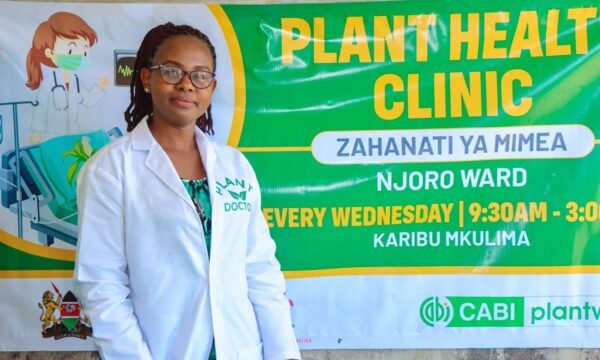
Farmers listen to the plant doctors whilst they wait their turn. Ginigathhena crop clinic. Photo: Katherine Cameron ©CABI
24 June marked the launch of the first e-plant clinics pilot in Sri Lanka. Experienced plant doctors from ten plant clinics in Nuwara Eliya district came together to learn how tablet computers could enhance the current Permanent Crop Clinic Programme (PCCP) led by the Plant Protection Service, Department of Agriculture. Plant doctors learnt:
- how electronic data collection and submission could make it easier to collect data about crops and pests in the area
- how to use the Plantwise factsheets library app, ebooks library, and internet to access information resources during their clinics
- how to communicate with other plant doctors and local diagnostic experts using a chat app
- how to ensure that farmers receive good advice in a written recommendation, in the language and format (either SMS or paper) chosen by the farmer
All of this means that the plant doctors’ job should be a little easier in future and they have access to more support for diagnosing pests and providing management advice.

Plant doctor M.N. Sagarika uses her tablet to record data about A. Weerasooriya’s bean anthracnose problem. Photo: Abdul Rehman ©CABI
“It’s easy to carry [the tablet] to the field or any other place with lots of information inside it… The Plantwise factsheet app is easy to use and no need to carry lots of heavy books. Copy paste is more easy, accurate, comprehensive and detailed.” – NMM Chandana Kumara, plant doctor, Bulugahapitiya plant clinic.
It also means that new data can be submitted, collated and analysed quickly after the plant clinics so that stakeholders in the plant health system can use it to track distribution of pests, monitor quality of advice given to farmers, and feed back information to improve the service in future.
“For sharing and using the data e-crop clinics are very good because the data will come quicker. Previously it took a long time to process data – we would see it maybe the next season, not the same season.” – PT Bandara, previous National Coordinator, PCCP.
“Making the data available quicker will help me to monitor the crop clinics in Nuwara Eliya more easily. I can’t visit every clinic in the field but seeing the data will let me know what is going on.” – Ms PK Senevirathne, Deputy Director Extension, Nuwara Eliya district.
After the training the first e-plant clinics were run on 24 June in three locations: Ginigathhena, Ragala and Nildandahinna. The following day plant doctors were up and running on their own with further clinics, partnering up to support each other to serve the high demand from farmers and help each other with the new technology.

Farmers are interested to see SMS messages for the first time, sharing the information. Photo: Katherine Cameron ©CABI
The use of SMS is fairly new in Sri Lanka, where phones are generally used only for making phonecalls. Many mobile phones are not compatible for Sinhala script. Some farmers chose to receive recommendations via SMS, either because they had used SMS previously, or because they were curious to see it for the first time. They were excited to see a Sinhala recommendation on their phones for the first time, and promptly showed other farmers around them. They reported that SMS allowed them to carry the recommendation with them wherever they went, and that they could easily share it with others either to share the information with other farmers or to ask a friend to pick up any equipment/inputs that were recommended if they were closer to suppliers. Those who didn’t have a mobile phone or were less confidant with SMS received their recommendation on paper.
“Using the SMS service to solve our problems is an interesting way for us as it is easy, and wherever we are we can connect with our plant doctor.” – Indra Kumari, farmer visiting Ragala clinic for advice on pomegranate anthracnose.
“Using the tablet, I was able to get the prescription quickly. The plant doctor gave me a paper written prescription so I can get it read by my children.” – MWB Pemawathi, farmer visiting Ragala clinic for advice on potato bacterial wilt.
Plant doctors reported that they enjoyed using the tablets, but identified some challenges.
“The electronic prescription form is easy and quicker. It’s easy to use and also easy to find factsheets and pest management decision guides. But typing recommendations and sending SMS was difficult. I’m still not familiar with the tablet keyboard.” – NMM Chandana Kumara
Despite this, they are determined that practice will make the whole process easier.
The e-plant clinic pilot will run for 6 months in Sri Lanka, testing how the tablets can enhance the current crop clinic program. If the pilot is successful then PCCP coordinators will plan how to take this further within the context of the wider PCCP programme, which currently operates around 260 plant clinics across 16 districts.
4 Comments
Leave a Reply
Related News & Blogs
Training Sri Lanka’s agro-dealers in pesticide risk reduction
Agro-dealers provide vital support to Sri Lanka’s farmers. These agricultural input suppliers are often the first point of contact for smallholders who need advice on plant protection products. However, agro-dealers often lack formal training in safer…
3 July 2025





[…] Sri Lankan plant doctors launch e-plant clinics […]
[…] Sri Lankan plant doctors launch e-plant clinics […]
[…] Sri Lankan plant doctors launch e-plant clinics […]
[…] Sri Lankan plant doctors launch e-plant clinics […]